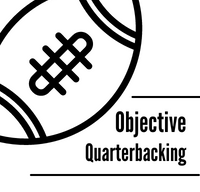Why do we need better methods of evaluating quarterback play?
Context is everything in life, and it is no different in sports.
The situations players find themselves in throughout a season and how they perform in those spots expose the type of player an athlete is.
The major flaw of traditional stat sheets is that they do not tell you how a player accumulated the numbers next to their name.
While anyone can easily pinpoint “garbage time” situations that allow quarterbacks to “stat pad” their way to impressive meaningless statistics, that context is ultimately lost along the way since the numbers (and history) will be written down without it.
This is the main reason stat comparisons are completely pointless and are very inaccurate in telling us which players actually performed better than the other.
But left without a real evaluation tool individuals fall into the fallacy of using these same flawed numbers to claim that certain players played well or not.
Legacies should not be shaped by inaccurate data systems, especially when the rules are constantly changing the way the game is played.
We live in an era of over inflated passing statistics, where even below average players have better statistical seasons in these traditional metrics than all time greats. When that happens there’s a loss of credibility.
How do we resolve these issues?
While the eye test is widely considered the best method of judging whether someone is playing well or not, keeping track of every single play for every single game for every season is an impossible task for any one person.
And even if that were possible objectivity is an important factor to consider, as some players have more aesthetically pleasing styles of play, are more likable, or the opposite of those two, it will be hard for an evaluator to not become a subjective spectator and favor one style of quarterbacking over another.
Having statistics that actually try to implement context into their equations would solve a lot of these subjectivity issues.
Stats that evaluate context, and not how pretty a football is thrown and don’t care about a players past reputation will tell us which players are actually playing the best at any given moment.
Luckily, there are some stats like that, these “advanced” statistics as they are often called do try to judge performance on a multitude of factors not accounted for in traditional stats.
Which of these advanced statistics should we use to evaluate these quarterbacks?
The following advanced statistics do the best job at leaving bias aside in their evaluation of players:
- Adjusted Net Yards Per Passing Attempt (ANY/A)
- Defense-adjusted Yards Above Replacement (DYAR)
- Defense-adjusted Value Over Average (DVOA)
- Expected Points Added Per Play (EPA/Play) and EPA+CPOE Composite (which is made up from EPA/Play and the Completion Percentage Over Expectation stat)
Qualifying player’s ranking in those distinct advanced statistics is then averaged out in our final quarterback rankings.
This is not a perfect system by any means but it does paint a better picture than traditional statistics do of telling us who were truly the best players in any particular season of play.
